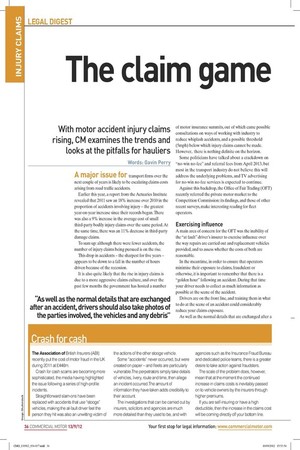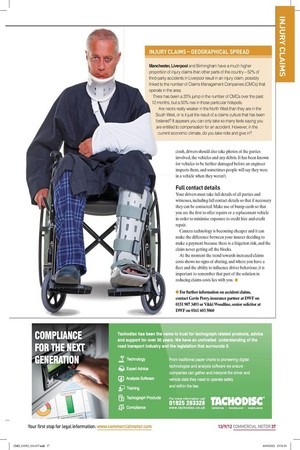The claim game
Page 22

Page 23

If you've noticed an error in this article please click here to report it so we can fix it.
With motor accident injury claims rising, CM examines the trends and looks at the pitfalls for hauliers
Words: Gavin Perry A major issue for transport irms over the next couple of years is likely to be escalating claims costs arising from road trafic accidents.
Earlier this year, a report from the Actuaries Institute revealed that 2011 saw an 18% increase over 2010 in the proportion of accidents involving injury – the greatest year-on-year increase since their records began. There was also a 9% increase in the average cost of small third-party bodily injury claims over the same period. At the same time, there was an 11% decrease in third-party damage claims.
To sum up: although there were fewer accidents, the number of injury claims being pursued is on the rise.
This drop in accidents – the sharpest for ive years – appears to be down to a fall in the number of hours driven because of the recession.
It is also quite likely that the rise in injury claims is due to a more aggressive claims culture, and over the past few months the government has hosted a number of motor insurance summits, out of which came possible consultations on ways of working with industry to reduce whiplash accidents, and a possible threshold (5mph) below which injury claims cannot be made. However, there is nothing deinite on the horizon.
Some politicians have talked about a crackdown on “no-win no-fee” and referral fees from April 2013, but most in the transport industry do not believe this will address the underlying problems, and TV advertising for no-win no-fee services is expected to continue.
Against this backdrop, the Ofice of Fair Trading (OFT) recently referred the private motor market to the Competition Commission: its indings, and those of other recent surveys, make interesting reading for leet operators.
Exercising influence
A main area of concern for the OFT was the inability of the “at fault” driver’s insurer to exercise inluence over the way repairs are carried out and replacement vehicles provided, and to assess whether the costs of both are reasonable.
In the meantime, in order to ensure that operators minimise their exposure to claims, fraudulent or otherwise, it is important to remember that there is a “golden hour” following an accident. During that time your driver needs to collect as much information as possible at the scene of the accident.
Drivers are on the front line, and training them in what to do at the scene of an accident could considerably reduce your claims exposure.
As well as the normal details that are exchanged after a crash, drivers should also take photos of the parties involved, the vehicles and any debris. It has been known for vehicles to be further damaged before an engineer inspects them, and sometimes people will say they were in a vehicle when they weren’t.
Full contact details
Your drivers must take full details of all parties and witnesses, including full contact details so that if necessary they can be contacted. Make use of bump cards so that you are the frst to offer repairs or a replacement vehicle in order to minimise exposure to credit hire and credit repair.
Camera technology is becoming cheaper and it can make the difference between your insurer deciding to make a payment because there is a litigation risk, and the claim never getting off the blocks.
At the moment the trend towards increased claims costs shows no signs of abating, and where you have a leet and the ability to inluence driver behaviour, it is important to remember that part of the solution in reducing claims costs lies with you. ■
• For further information on accident claims, contact Gavin Perry, insurance partner at DWF on 0151 907 3493 or Vikki Woodine, senior solicitor at DWF on 0161 603 5060
Crash for cash
The Association of British Insurers (ABI) recently put the cost of motor fraud in the UK during 2011 at £446m.
Crash for cash scams are becoming more sophisticated, the media having highlighted the issue following a series of high-profile incidents.
Straightforward slam-ons have been replaced with accidents that use “stooge” vehicles, making the at-fault driver feel the person they hit was also an unwitting victim of the actions of the other stooge vehicle.
Some “accidents” never occurred, but were created on paper – and fleets are particularly vulnerable.The perpetrators simply take details of vehicles, livery, route and time, then allege an incident occurred.The amount of information they have taken adds credibility to their account.
The investigations that can be carried out by insurers, solicitors and agencies are much more detailed than they used to be, and with agencies such as the Insurance Fraud Bureau and dedicated police teams, there is a greater desire to take action against fraudsters.
The scale of the problem does, however, mean that at the moment the continued increase in claims costs is inevitably passed on to vehicle owners by the insurers through higher premiums.
If you are self-insuring or have a high deductible, then the increase in the claims cost will be coming directly off your bottom line.
INJURY CLAIMS – GEOGRAPHICAL SPREAD
Manchester, Liverpool and Birmingham have a much higher proportion of injury claims than other parts of the country – 52% of third-party accidents in Liverpool result in an injury claim, possibly linked to the number of Claims Management Companies (CMCs) that operate in the area.
There has been a 20% jump in the number of CMCs over the past 12 months, but a 50% rise in those particular hotspots.
Are necks really weaker in the North West than they are in the South West, or is it just the result of a claims culture that has been fostered? It appears you can only take so many texts saying you are entitled to compensation for an accident. However, in the current economic climate, do you take note and give in?




































